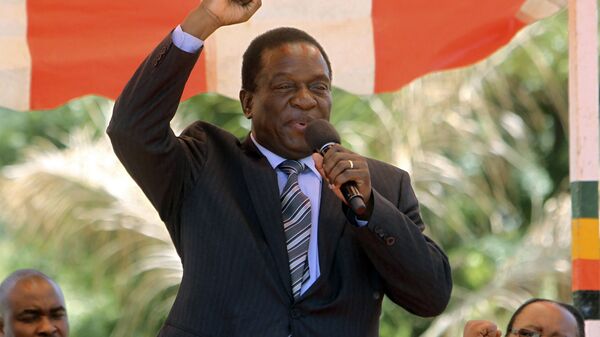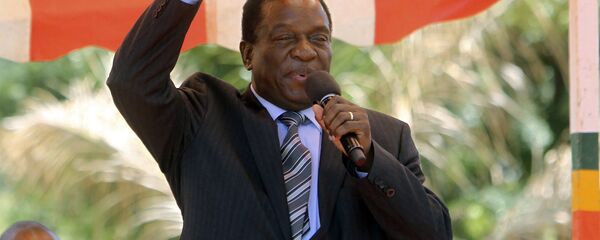MOSCOW (Sputnik) — Mnangagwa will succeed Robert Mugabe, who has been leading Zimbabwe for over 30 years as both president and prime minister, and who was recently forced to resign.
He will serve as the country's interim president until late August 2018, when Mugabe’s term was set to expire and after that, the people of Zimbabwe are set to elect their next leader.
Nicknamed 'Crocodile'
Vladimir Shubin, a chief research associate with the Russian Academy of Sciences’ Africa Institute and a Valdai Club expert, told Sputnik that Mnangagwa owed his nickname to the name of the Crocodile Gang. The team was engaged in delivering weapons to guerrilla units operating in South Rhodesia and also provided them with militants.
"I do not know the details of Zimbabwean mythology, but a crocodile is a very positive nickname in many African countries. The crocodile plays the same role as the bear or the lion in Russia. Yes, Mnangagwa was a member of the so-called Crocodile Gang whose militants staged attacks and committed violence. I cannot say whether their actions were justified or not," Shubin noted.
Turbulent Past
Mnangagwa's biography is full of interesting facts. For instance, he was arrested for helping derail a train and sentenced to death, however, later the death penalty was commuted to a ten-year prison sentence because he was less than 21 years old at that time.
He studied in prison and received a bachelor's degree in law from London University. In 1973-1974, he studied at the University of Zambia. In 1977, Mnangagwa was elected to the top leadership of the ZANU.
Mnangagwa served as security minister in the first government of independent Zimbabwe and headed the Central Intelligence Organization, the country’s main secret service. He later served as the minister of justice, the minister of finance, the speaker of the parliament’s lower house and the defense minister.
READ MORE: Mnangagwa to Be Sworn in as Zimbabwe's President on Friday — State TV
In 2014, Mnangagwa was appointed first vice president of Zimbabwe and oversaw defense and state security issues, justice matters, and the Central Bank’s activities. As Mugabe’s loyal supporter, he was seen as the most likely successor to the aging head of state.
Dismissal
However, Mnangagwa's political career was threatened after he had become first vice president as Mugabe’s wife Grace who also wanted to become the country's new leader urged her husband to dismiss the official, claiming that he was planning to stage a coup. On November 6, Mugabe sacked Mnangagwa, with the latter leaving the country, fearing for his life and his family’s safety.
According to Shubin, Mugabe's wife was indeed seeking to grab power, and there was no external influence on the events in the country.
"I do not think there was any serious foreign influence on Zimbabwean developments. This is not to mention the fact that, all these years, Western countries demonized Mugabe and created problems for the country’s development. This was a domestic affair of the ZANU-PF because the opposition did not play any substantial role in the country," Shubin said.
Interim President
On Tuesday, Speaker of the country’s National Assembly (parliament) Jacob Mudenda said that the country’s ruling party ZANU-PF had nominated Mnangagwa for president and that his inauguration was set for Friday.
Shubin explained that under the Constitution of Zimbabwe, a party that had the majority of seats in parliament had the right to appoint its own president until the incumbent president’s term expired.
"Participants in the Central Committee’s plenary meeting have already decided to appoint Mnangagwa, and he can serve as president until August 2018 when the next presidential elections are to be held," Shubin said.
He expressed hope that the attitude of Western countries toward Zimbabwe would improve after Mugabe’s resignation.
"The situation should become more stable, and the West should scale down its sanctions against Zimbabwe. By the way, the European Union has already lifted sanctions, except those against Mugabe and his wife. The United States has not lifted sanctions because it does not have any major economic interests there. And Europe has many interests, especially in the diamond industry," he added.
However, Mnangagwa remains on the US sanctions list, Shubin pointed out.
Bring Democracy to Zimbabwe
According to Democratic Assembly for Restoration and Empowerment (DARE) Head of Communications Clemence Tauya Tabatapashi Nhliziyo, Emmerson Mnangagwa should start democratic reforms and rebuild Zimbabwe's economy after becoming president.
READ MORE: Zimbabwe: 'Things Will Probably Be the Same' Under New President – Researcher
"Most importantly we expect Mnangagwa to curb corruption. Measures and stiffer penalties should be put in place to curb corruption. We expect all corrupt officials to be prosecuted and stiffer penalties given so as to deter corruption," Nhliziyo said.
Other expectations that DARE has for Mnangagwa’s policy when he takes the office of president are electoral reforms to enable free and fair elections in 2018, and more cooperation with the international community to increase the flow of foreign investment into the country.



